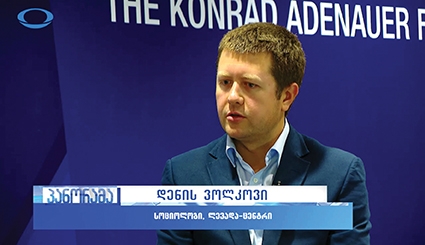Denis Volkov on Sanctions, Putin, Abkhazia & South Ossetia
It takes time and effort for an expert and a think tank from Russia to earn a trustworthy tag from Western media and analytics. Denis Volkov and Levada Center both enjoy this kind of reputation. As he was attending the Konrad Adenauer Foundation’s conference on the Eastern Partnership at the end of June, GEORGIA TODAY and Panorama TV Show seized the opportunity to pepper the well-liked Russian sociologist with questions on Putin’s popularity at home and abroad, the weight on sanctions and the perception of Georgia’s breakaway regions in Russian society.
Sanctions have been prolonged against Russia, both in the US and Europe. What are their long-term impacts and how is Russia coping with it?
I’m not an economist, I’m a sociologist. But what we see is that the economic crisis which we had for 2.5 years is more or less over. According to our data, according to the feelings of the people, the deterioration of living standards ended somewhere this spring. We’ve also been seeing a rise in social and consumer optimism over the past several months. Speaking specifically about sanctions. I’d say it’s more psychological and the majority says they’d like Russia to go with the sanctions and counter-sanctions because it’s a matter of national pride. They say we should not give in, and at the same time say they want to see the end of sanctions, to get along with the West, but only if the west starts first. According to the government and majority of the population, the West is to blame. Putin said that Crimea was just an excuse for the West to impose sanctions. The majority agrees.
How popular is Putin in Russia and abroad?
I will start with Putin’s popularity in Russia. We have different measurements. We do them on an almost monthly basis. One is the approval rating of the president and it is really high, about 80%. At the same time, you can’t compare it to the approval ratings of western leaders where there is competition or criticism on TV- which doesn’t happen in Russia. There are no attacks on these ratings and around half the population is ready to vote for him. There was a dramatic change after the annexation of Crimea because it was seen by the majority of the public as a revival of Russia’s greatness, that we can do anything despite western criticisms. We saw then a huge increase in popularity. That said, only about 8% like Putin very much, while the majority has more or less neutral acceptance of the status quo. So, Putin is not bad guy. One third of the population says I cannot say anything bad about Putin. What kind of popularity is that?
As for the West, as I understand, it is more about dissatisfaction with the US, maybe with Europe, where the people are dissatisfied with western politics- there Putin is very popular. Putin and Russia are seen as a person and country that defy the West. If you don’t like the West, Putin’s got appeal. If you agree with the West and see its policies as being beneficial to the given country, Putin is usually unpopular.
In Alexei Navalny’s recent interview, he said he sees Abkhazia and South Ossetia as independent countries. What should Georgians expect from him if he ever becomes a major political figure in Russian governance?
I think he’s acting like a very cunning politician. He would not defy the majority. He really wants to be popular in Russia, he wants to be president one day. I think he’ll follow the mass attitudes.
As regards his statements on Abkhazia and South Ossetia, I think it’s a populist move and it’s again what the majority of the public opinion think about Abkhazia and South Ossetia. I think about half the population says they are independent and should be independent and there are 1/5 of them who say that they should be incorporated into Russia. It changed after Crimea because the sanctions that followed were seen as a bad move and hurt Russia in some sense. After that, public opinion changed, seeing fewer people ready to welcome Abkhazia and South Ossetia into Russia. But still, there was a conflict and this explains why the majority sees them as independent.
The Kremlin recently announced a major cut in the regional budget for the two breakaway regions. How do you think this will affect them?
It will be harder for them. These territories heavily depend on Russian support. Of course, without it, more tensions will be seen and more questions will be asked. As there was a war, it is a very hard topic and there is a long to go for reconciliation for both sides.
Tskhinvali seems to be adamant on seeing through the referendum on joining Russia. How feasible is that?
Russians would prefer the existing status quo. It will only happen if decided so in the Kremlin. I don’t know whether the Kremlin wants this to happen right now. Maybe if it feels frustrated with the West, for example if it tries to approach Trump to no avail and then feel ‘we have nothing to lose, let’s take this step’. But my general understanding is that the Kremlin doesn’t want the joining right now because they still seek some kind of negotiation or reconciliation. Because again, those sanctions hurt.
Vazha Tavberidze












